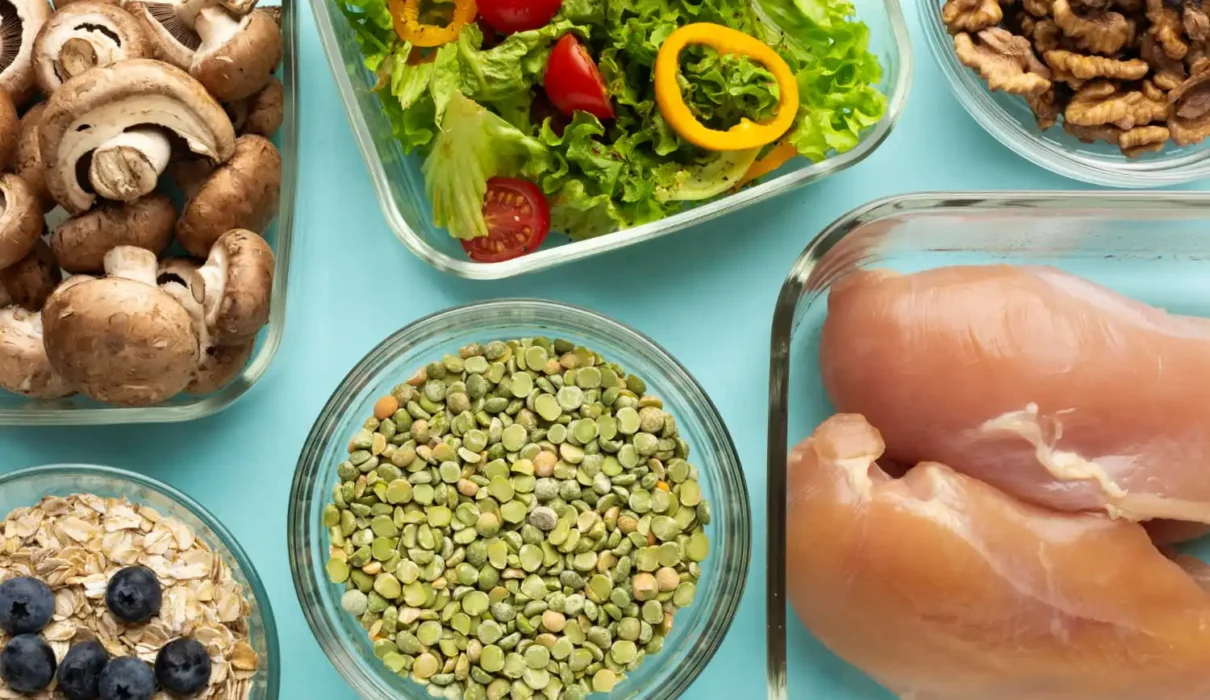Introduction:
When you have a kidney problem, it’s important to watch what you eat very carefully. You need to plan your meals carefully to make sure they’re good for your kidneys. This helps you control your condition better. In this guide, we’ll delve into creating a comprehensive 7-day renal diet plan for kidney disease specifically designed to support kidney health, ensuring that each meal is both nourishing and kidney-friendly.
Day 1
Berry Oatmeal Breakfast
- Nutrient-Rich: Oatmeal is a great source of fiber, providing sustained energy and aiding digestion. Berries are packed with antioxidants, helping to combat inflammation and support overall health.
- Kidney-Friendly: Oatmeal is low in phosphorus and potassium, making it suitable for a renal diet. Berries add natural sweetness without the need for added sugars, reducing the intake of refined carbohydrates.
Chicken Salad Lunch

- Nutrient-Rich: Oatmeal is a great source of fiber, providing sustained energy and aiding digestion. Berries are packed with antioxidants, helping to combat inflammation and support overall health.
- Kidney-Friendly: Oatmeal is low in phosphorus and potassium, making it suitable for a 7-day renal diet plan. Berries add natural sweetness without the need for added sugars, reducing the intake of refined carbohydrates.
Dinner: Baked salmon with steamed vegetables

- Omega-3 Fatty Acids: Salmon is rich in omega-3 fatty acids, which have anti-inflammatory properties and are beneficial for heart health. Omega-3s may also help reduce the risk of cardiovascular complications associated with kidney disease.
- Kidney-Friendly Protein: Salmon provides high-quality protein with lower phosphorus content compared to other animal proteins, making it an excellent choice for individuals with kidney disease.
Day 2
Breakfast: Greek Yogurt with Sliced Almonds and Honey
- Protein Powerhouse: Greek yogurt serves as an excellent source of high-quality protein, essential for muscle maintenance and repair. The addition of sliced almonds further boosts protein content and provides healthy fats for satiety.
- Nutrient-Rich: Greek yogurt is rich in calcium, which is vital for bone health. Almonds offer vitamin E, an antioxidant that supports immune function and skin health, while honey adds a touch of natural sweetness without added sugars.
Lunch: Quinoa and Vegetable Stir-Fry
- Plant-Powered Protein: Quinoa is a complete protein, containing all nine essential amino acids, making it an ideal meat alternative for vegetarians and vegans. Combined with a colorful array of vegetables, this stir-fry provides a satisfying and nutritious meal.
- Fiber-Rich: Both quinoa and vegetables are rich in dietary fiber, which promotes digestive health and helps regulate blood sugar levels. This can be particularly beneficial for individuals with diabetes, a common complication of kidney disease.
Dinner: Turkey Chili with Kidney Beans
- Lean Protein Source: Turkey is a lean protein source, offering essential nutrients like iron and B vitamins without the high saturated fat content found in red meats. Kidney beans add extra protein and fiber, promoting fullness and supporting digestive health.
- Rich in Antioxidants: Chili powder and other spices used in this recipe contain antioxidants that help reduce inflammation and protect against cellular damage. This can be beneficial for individuals with kidney disease, as inflammation plays a role in disease progression.
Day 3
Breakfast: Whole Grain Avocado Toast

- High-fiber whole grain toast provides sustained energy and supports digestive health.
- Avocado offers heart-healthy fats and potassium while being low in sodium, suitable for kidney health.
- A nutritious and satisfying breakfast option that helps regulate blood sugar levels.
Lunch: Lentil Spinach Soup
- Lentils are a fantastic source of plant-based protein, rich in fiber, and low in phosphorus, ideal for kidney health.
- Spinach adds essential vitamins and minerals like iron and folate, without contributing high potassium levels.
- A warm and comforting soup option that promotes satiety and supports overall well-being.
Dinner: Grilled Shrimp with Roasted Sweet Potatoes
- Shrimp is a low-fat protein source that’s low in phosphorus and potassium, making it kidney-friendly.
- Roasted sweet potatoes offer a delicious and nutritious source of complex carbohydrates, vitamins, and minerals.
- A flavorful and balanced dinner choice that’s easy to prepare and beneficial for kidney health.
Day 4
Breakfast: Egg White Veggie Omelette
- Whisked egg whites combined with colorful diced vegetables such as bell peppers, onions, and spinach create a flavorful and protein-packed omelette.
- Heat a non-stick skillet, pour in the egg whites, and add the chopped vegetables. Cook until the omelette sets, then fold it over and serve hot.
Lunch: Tuna Salad with Mixed Greens
- Mix canned tuna with crisp mixed greens, cherry tomatoes, cucumber slices, and your choice of low-phosphorus dressing for a refreshing and protein-rich salad.
- Drain the canned tuna and combine it with the vegetables in a bowl. Add the dressing and toss until well-coated, then serve chilled.
Dinner: Vegetarian Curry with Brown Rice
- Ingredients: Prepare a fragrant curry using an assortment of kidney-friendly vegetables such as cauliflower, carrots, and bell peppers, simmered in a flavorful blend of spices and coconut milk. Serve alongside brown rice for a wholesome meal.
- Preparation: Sauté the vegetables in a pan, add the curry spices, and simmer with coconut milk until tender. Serve the curry over cooked brown rice.
Day 5
Breakfast: Smoothie with Spinach, Banana, and Almond Milk
- Blend together a handful of fresh spinach, one ripe banana, and a cup of almond milk for a nutrient-packed breakfast.
- This smoothie is rich in vitamins, minerals, and antioxidants, providing a refreshing and energizing start to your day.
Lunch: Grilled Tofu with Quinoa Salad
- Marinate tofu slices in a flavorful sauce, then grill until lightly browned and serve alongside a hearty quinoa salad.
- Tofu is a great source of plant-based protein, while quinoa offers a dose of protein and fiber, making this meal satisfying and kidney-friendly.
Dinner: Beef Stew with Root Vegetables
- Slow-cook lean beef with an array of colorful root vegetables like carrots, parsnips, and potatoes for a hearty and comforting stew.
- This dish is not only delicious but also provides essential nutrients like iron and vitamin C from the beef and vegetables, making it a wholesome choice for dinner.
Day 6
Breakfast: Cottage Cheese with Pineapple Chunks
- Cottage cheese is a great source of high-quality protein, which is essential for maintaining muscle mass and supporting overall health.
- Pineapple adds a sweet and refreshing flavor while providing vitamin C and manganese, both beneficial for immune function and bone health.
Lunch: Spinach and Feta Stuffed Bell Peppers
- Spinach is rich in vitamins A, C, and K, as well as iron and antioxidants, promoting overall health and aiding in managing kidney disease.
- Feta cheese adds a tangy flavor and a boost of protein, but should be used in moderation due to its sodium content.
Dinner: Roast Chicken with Mashed Cauliflower
- Roast chicken is a lean protein source that is low in phosphorus and potassium, making it suitable for a kidney-friendly diet.
- Mashed cauliflower serves as a nutritious alternative to mashed potatoes, providing fiber, vitamins, and minerals without the potassium content found in potatoes.
Day 7
Breakfast: Whole Grain Cereal with Low-Fat Milk
- Opt for whole grain cereal high in fiber, such as oatmeal or bran flakes, to promote digestive health.
- Pair it with low-fat milk, rich in calcium and protein, to support bone health and provide essential nutrients for overall well-being.
Lunch: Vegetable and Bean Burrito Bowl
- Load up on a variety of colorful vegetables like bell peppers, onions, and tomatoes, which are packed with vitamins, minerals, and antioxidants.
- Incorporate beans, such as black beans or kidney beans, for plant-based protein and fiber, promoting satiety and aiding in blood sugar regulation.
Dinner: Baked Cod with Asparagus
- Enjoy lean protein with baked cod, a heart-healthy choice that provides essential omega-3 fatty acids for reducing inflammation and supporting cardiovascular health.
- Pair it with asparagus, a low-potassium vegetable rich in fiber and folate, which helps maintain healthy blood pressure and supports kidney function.
Conclusion:
Following a carefully planned 7-day renal diet plan tailored to kidney disease can significantly improve your overall health and well-being. By incorporating nutrient-rich foods while limiting sodium, phosphorus, and potassium, you can better manage the progression of kidney disease and maintain optimal kidney function. Remember to consult with a healthcare professional or a registered dietitian to personalize your meal plan according to your specific dietary needs and health goals.
Read more: The Ultimate Dirty Keto Diet Guide and Meal Plan.
Frequently Asked Questions:
Q1: Can I include dairy in my 7-day renal diet meal plan?
Yes, you can include dairy products like low-fat milk, yogurt, and cheese in moderation, but it’s important to choose lower phosphorus options and monitor your intake.
Q2: How much protein should I consume daily with kidney disease?
Protein needs vary depending on the stage of kidney disease and other individual factors. Consult with a healthcare provider or dietitian to determine your specific protein requirements.
Q3: Are there any fruits and vegetables I should avoid?
Some fruits and vegetables are higher in potassium and phosphorus, so it’s essential to limit intake of potassium-rich foods like bananas, oranges, and potatoes, and choose lower phosphorus options such as berries, apples, and cauliflower.
Q4: Can I drink coffee or tea with kidney disease?
While coffee and tea are generally okay in moderation, it’s important to monitor your fluid intake, especially if you’re on a fluid restriction. Additionally, be mindful of additives like cream and sugar, which can add extra calories and affect blood sugar levels.







